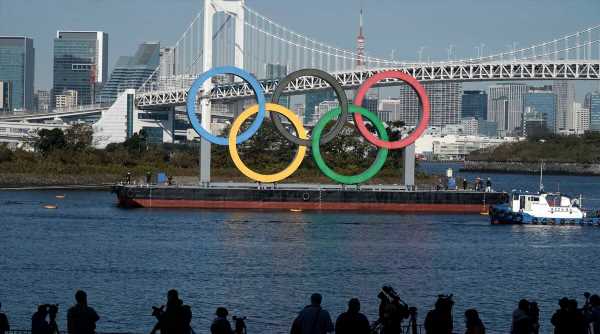The International Olympic Committee (IOC) has remained firm in its “absolute yes” stance, while recent surveys have revealed that a majority of Japanese citizens are calling for the Games to be cancelled or postponed.
In just under two months, an estimated 100,000 people; officials, journalists, coaches, volunteers and the world’s best athletes, will be in Tokyo for the Olympics. The buzz has picked up but as the country battles a fourth wave of the COVID-19 outbreak, there are two different schools of thought.
The International Olympic Committee (IOC) has remained firm in its “absolute yes” stance, while recent surveys have revealed that a majority of Japanese citizens are calling for the Games to be cancelled or postponed.
On Wednesday, a leading Japanese daily, also a sponsor for the Tokyo Olympics, published an editorial “demanding” the Games be cancelled.
IOC unmoved
IOC vice president and chairman of IOC coordination commission for Tokyo, John Coates reaffirmed the organisation’s stance in holding the Olympics. At a recent press conference, Coates said: “We have successfully seen five sports hold test events during a state of emergency,” he was quoted by The New York Times. “All of the plans to protect the safety and security of athletes are based around the worst possible circumstances. So the answer is absolutely yes.”
In relation to the polls indicating a good number of citizens want the Games to be cancelled/postponed, he said, “I am expecting as the number of vaccinations increase, public opinion will improve.”
In the event that public opinion doesn’t change, he added: “Then our position is, we just have to make sure that we get on with our job. And our job is to ensure these Games are safe for all of the participants and all the people who might come into contact with the participants.”
According to The Guardian, IOC president Thomas Bach recently said while addressing the International Hockey Federation (IHF): “The athletes definitely can make their Olympic dreams come true. We have to make some sacrifices to make this possible.”
The comments of both officials have received criticism in Japan.
Asahi Shimbun editorial
One of the country’s leading dailies and also a sponsor for the Olympics, The Asahi Shimbun, had conducted a survey with 1,527 responses on May 15-16. It determined that 83 percent of people were against the Olympics being held, 43 percent called for it to be cancelled and 40 percent opted for it to be postponed.
This was in comparison to a poll in April that resulted in 69 percent people calling for it not to happen, 35 percent calling for cancellation and 34 percent for postponement.
The newspaper, on Wednesday, however, published an editorial claiming “it is simply beyond reason to hold the Tokyo Olympics and Paralympics this summer.”
The editorial called for Prime Minister Yoshihide Suga to cancel the Games, while criticizing Coates’ comments.
“Coates’ thinking was clearly at odds with popular sentiment in Japan, and his attitude of saying ‘yes’ to the Games without presenting any supporting evidence served only to remind us anew of the IOC’s self-righteousness.”
One of the major concerns the piece addressed was the possibility of the event becoming a super-spreader.
“There is no discounting the possibility that after virus carriers from around the world have converged in Japan, the virus will then scatter to all over the world.”
Healthcare on edge
Currently, based on various reports, Japan has vaccinated between just two and four percent of its 126 million population. Ten areas in the country, including Tokyo and Osaka are currently in a ‘state of emergency,’ as the total deaths since the start of the pandemic reached 12,497 (as of 19:00 hrs IST on Wednesday).
The country’s healthcare system, meanwhile, has been stretched, and the Tokyo Medical Practitioners’ Association last week made public a letter written to PM Suga, Tokyo governor Yuriko Koike, and organizing committee head Seiko Hashimoto, asking them not to go ahead with the Olympics.
“The medical systems are stretched thin, almost to their limits. The reality is that the entire medical system faces an almost insurmountable hardship in trying our best to respond with coronavirus measures.
“The doctors and nurses of the medical system who are being asked to respond are already at this point exhausted, and there is absolutely no extra manpower or facility for treatment,” the letter said, as reported by the Associated Press (AP).
AP also reported that the Tokyo organizers have asked for 10,000 medical personnel, 500 extra nurses and 200 sports medicine specialists.
Money talks
According to AP, the IOC earns 75 percent of its revenue from selling television rights for the Olympics, and a further 18 percent from sponsorship deals. Meanwhile the Japanese government has spent around USD 15.4 billion to organize the Games, a sum it stands to lose in case of cancellation.
However, if the Games are held and it leads to a sharp rise in infections, the economic loss could be greater.
“If the (Olympics) trigger the spread of infections and necessitate another emergency declaration, then the economic loss would be much greater than cancellation,” The Guardian quoted Takahide Kiuchi, executive economist at Nomura Research Institute and a former board member of the Bank of Japan.
The report further stated that “the first nationwide state of emergency last spring had caused an estimate of 6.4 trillion yen loss (nearly USD 59 billion).”
Source: Read Full Article


